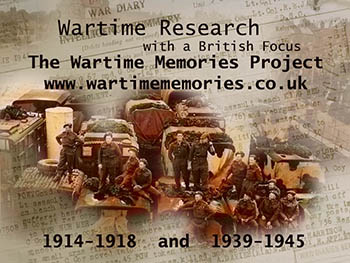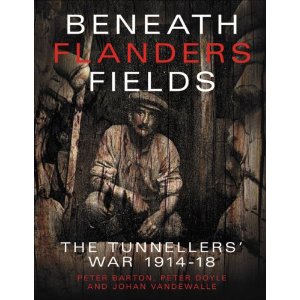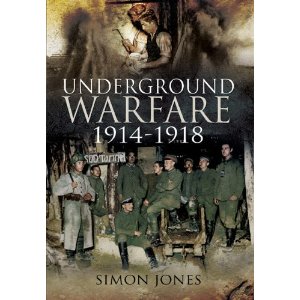|
|
|
3rd Canadian Tunnelling Company, Canadian Expeditionary Force
| Want to know more about 3rd Canadian Tunnelling Company, Canadian Expeditionary Force? There are:192 items tagged 3rd Canadian Tunnelling Company, Canadian Expeditionary Force available in our Library There are:192 items tagged 3rd Canadian Tunnelling Company, Canadian Expeditionary Force available in our Library 
These include information on officers, regimental histories, letters, diary entries, personal accounts and information about actions during the Great War.
|
|
|
|
The Wartime Memories Project is the original WW1 and WW2 commemoration website.

- 1st of September 2024 marks 25 years since the launch of the Wartime Memories Project. Thanks to everyone who has supported us over this time.
|
Want to find out more about your relative's service? Want to know what life was like during the Great War? Our
Library contains many many diary entries, personal letters and other documents, most transcribed into plain text.
|
Looking for help with Family History Research?
Please see Family History FAQ's
Please note: We are unable to provide individual research.
|
|
Can you help?
The free to access section of The Wartime Memories Project website is run by volunteers and funded by donations from our visitors.
If the information here has been helpful or you have enjoyed reaching the stories please conside making a donation, no matter how small, would be much appreciated, annually we need to raise enough funds to pay for our web hosting or this site will vanish from the web.
If you enjoy this site
please consider making a donation.
Announcements
- 26th Mar 2025
Please note we currently have a massive backlog of submitted material, our volunteers are working through this as quickly as possible and all names, stories and photos will be added to the site. If you have already submitted a story to the site and your UID reference number is higher than
265607 your submission is still in the queue, please do not resubmit.
Wanted: Digital copies of Group photographs, Scrapbooks, Autograph books, photo albums, newspaper clippings, letters, postcards and ephemera relating to the Great War. If you have any unwanted
photographs, documents or items from the First or Second World War, please do not destroy them. The Wartime Memories Project will give them a good home and ensure that they are used for educational purposes. Please get in touch for the postal address, do not sent them to our PO Box as packages are not accepted.
|
World War 1 One ww1 wwII greatwar great battalion regiment artillery
Did you know? We also have a section on World War Two. and a
Timecapsule to preserve stories from other conflicts for future generations.
|
|
|
Pte. Ernest Hudson 2nd Battalion Otago Regiment Ernest Hudson served with the 2nd Battalion, Otago Regiment, he was attached to the 3rd Canadian Tunnelling Company.
|
Spr. Harold Hawkin 3rd Canadian Tunnelling Company. (d.18th June 1918) Harold Hawkin was the 32 year old son of John Horsley and Anne Hawkin, of York and husband of Millicent Hawkin, of 4 Langdale Rd., Scarborough. He married Millie (nee Beastall) during the war. Born in York, England, in 1886, Hawkin was attested in April 1915 and embarked for France in July where he was taken on strength of 171 Tunnelling Coy. Royal Engineers and then transferred to the 3rd Canadian Tunnelling Company.
He is commemorated on the St Paul’s Church War Memorial, Holgate and in The King’s Book. His medals are held by the Canadian War Museum in Ottawa and appear on their website.
Harold died on 18th of June 1918 of Erysipelas. Millie related the story that Harold had been badly gassed earlier but had been sent back into action before he had enough time to fully recover. She blamed his subsequent death on his poor health and his body's inability to fight off the infection that took his life. Harold died at No. 14 Stationary Hospital, Wimereux, France and is buried in Terlincthun British Cemetery, Wimille, France.
Erysipelas is a type of skin infection usually caused by group A Streptococcus bacteria. The bacteria may travel to the blood in some cases. This results in a condition called bacteremia. The infection may spread to the heart valves, joints, and bones. Erysipelas is now a treatable disease.
|
Pte. John Robert McDougall 3rd Canadian Tunnelling Company John McDougall was born on 2 April 1883 at Westville, Nova Scotia, son of Roderick and Katherine McDougall. The family moved to New Aberdeen, where Roderick, John and a brother were coal miners. John was working in a mine at Glace Bay when he enlisted in the 246th Battalion at Aldershot on 29th of August 1916. Upon arrival in England in June 1917, he was transferred into the 185th Battalion. When it was also broken up he was transferred into the 17th Reserve Battalion, then into No 3 Tunnelling Company on 25th of April 1918. He then went to France and served until being hospitalized at Boulogne with a hernia on 6 October 1918. He was sent back to England and returned home in March 1919.
|
John Hampton Stewart 3rd Canadian Tunnelling Company. (d.14/7/1961) John Hampton Stewart was attached to the 3rd Canadian Tunnelling Company from 12/3/1917 to 14/5/1917. He then returned to the NZ forces 2nd Field Company NZ Engineers.
|
Spr. Arsene F. Cormier 3rd Canadian Tunnelling Coy (d.22nd October 1917) Arsene Cormier is my grandmother's half brother from St. Joseph du Moine, Cape Breton, Nova Scotia. My grandmother is Luce Chiasson. Her father Arsenne Chiasson died one year after she was born. Her mother remarried Fred Cormier - Arsene F. Cormier is their son.
|
Sapper Arthur Frederick Chilcot att 3rd Canadian Tunnelling Company Arthur Chilcot joined the NZ Expeditionary Force on 24th of December 1915 and was posted as a rifleman to 4th Btn. 3rd NZ Rifle Brigade on 20th of June 1916. Arthur was detached to the 3rd Canadian Tunnellers on 4th of May 1917, and was wounded (gunshot wound right leg) on 7th of June 1917. Arthur was sent to convalesce in Codford, UK, until 15th of November 1917 where he was transferred as a Sapper to 5 (NZ) Light Railway Operating Section.
|
Pte. George Wilkinson Snowdon 3rd Canadian Tunnelling Company. George Wilkinson Snowdon was my Grandfather, He left England to work in Canada. His attestation paper No. A24207 dated 25th Dec. 1915 records his army number as A424214 and was assigned to 45th Battalion Draft. On 19th July 1915 embarked to France to 5th battalion, then in Feb. 1916 attended 3rd Tunnelling Company and taken on strength on the 27th Jan. 1917.
George travelled to Canada in May 1913 From Greenside, Ryton on Tyne, County Durham, England. After the war he was given permission to marry my Grandmother Mable Alice Robson at Greenside on the 14th March 1919. He then returned to Seaford and was discharged from the Canadian Army on 2nd May 1919 in London.
He returned to Greenside where he farmed on his own farm with his two sons Leslie and Ernest until his death on 6th March 1970.
|
Recomended Reading.Available at discounted prices.
|
Beneath Flanders Fields: The Tunnellers War 1914-1918 Peter Barton, Peter Doyle & Johan Vandewalle
Whilst the war raged across Flanders fields, an equally horrifying and sometimes more dangerous battle took place underground. "Beneath Flanders Fields" tells the story of the tunnellers' war, which still remains one of the most misunderstood, misrepresented and mystifying conflicts of the Great War. A wealth of personal testimonies reveal the engineering, technology and science behind how this most intense of battles was fought - and won. They speak of how the tunnellers lived a relentless existence in the depths of the battlefield for almost two and a half years, enduring physical and mental stresses that were often more extreme than their infantry counterparts. Their lives were reduced to a complex war of silence, tension and claustrophobia, leading up to the most dramatic mine offensive in history launched on 7 June 1917 at Messines Ridge. Yet, Messines was not the end of their story, which continued with the crafting of a whole underground world of headquarters, cookhouses and hos
Underground Warfare 1914-1918 Simon Jones
Simon Jones's graphic history of underground warfare during the Great War uses personal reminiscences to convey the danger and suspense of this unconventional form of conflict. He describes how the underground soldiers of the opposing armies engaged in a ruthless fight for supremacy, covers the tunnelling methods they employed, and shows the increasingly lethal tactics they developed during the war in which military mining reached its apotheosis. He concentrates on the struggle for ascendancy by the British tunnelling companies on the Western Front. But his wide-ranging study also tells the story of the little known but fascinating subterranean battles fought in the French sectors of the Western Front and between the Austrians and the Italians in the Alps which have never been described before in English. Vivid personal testimony is combined with a lucid account of the technical challenges - and ever-present perils - of tunnelling in order to give an all-round insight into the extraord
|
|
|







